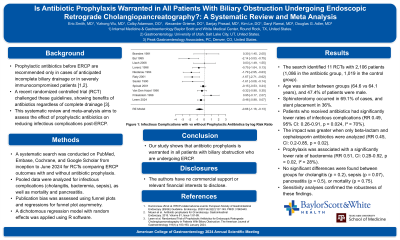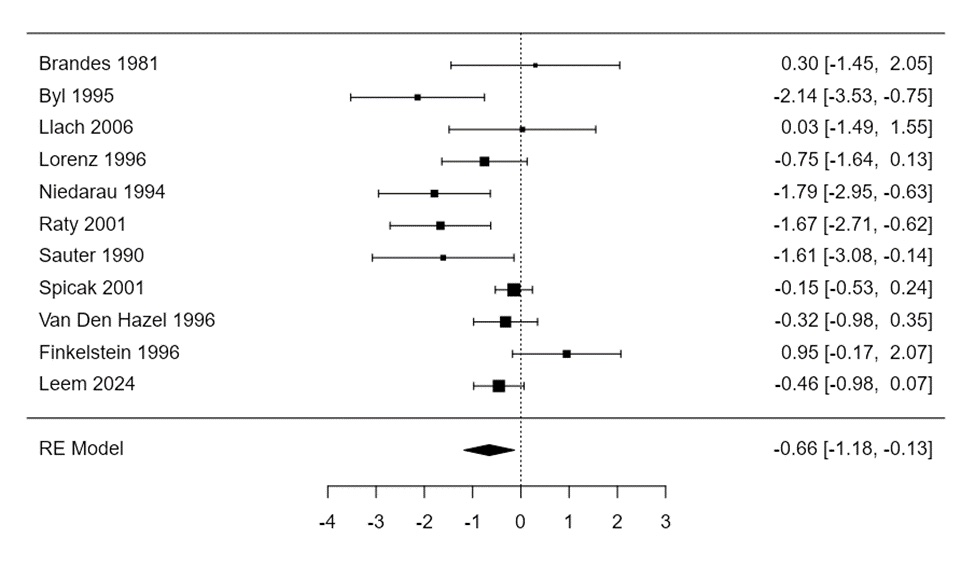Tuesday Poster Session
Category: Biliary/Pancreas
P3443 - Is Antibiotic Prophylaxis Warranted in All Patients With Biliary Obstruction Undergoing Endoscopic Retrograde Cholangiopancreatography? A Systematic Review and Meta-Analysis
Tuesday, October 29, 2024
10:30 AM - 4:00 PM ET
Location: Exhibit Hall E

Has Audio

Colby Adamson, DO
Baylor Scott & White Medical Center
Round Rock, TX
Presenting Author(s)
Eric Smith, MD1, Yizhong Wu, MD2, Colby Adamson, DO1, Alexander Grieme, DO3, Sanjay Prasad, MD1, Kim Minh Le, DO4, Daryl Ramai, MD, MPH, Msc5, Douglas Adler, MD6
1Baylor Scott & White Medical Center, Round Rock, TX; 2Baylor Scott & White Medical Center, Georgetown, TX; 3Baylor Scott & White Medical Center, Corpus Christi, TX; 4Baylor Scott & White Medical Center, Austin, TX; 5University of Utah Health, Salt Lake City, UT; 6Center for Advanced Therapeutic (CATE), Centura Health, Porter Adventist Hospital, Peak Gastroenterology, Denver, CO
Introduction: The use of prophylactic antibiotics before endoscopic retrograde cholangiopancreatography (ERCP) is currently recommended for use only in cases of anticipated incomplete biliary drainage or in patients who are severely immunocompromised. A recent randomized controlled trial (RCT) challenged existing guidelines, which showed a benefit regardless of complete drainage with ERCP. In this systematic review and meta-analysis, we aim to assess whether prophylactic antibiotics improve infectious complication rates after ERCP.
Methods: A systematic search of PubMed, Embase, Cochrane, and Google Scholar was performed from inception to June 2024 for RCTs comparing ERCP outcomes with and without antibiotic prophylaxis. Pooled data was analyzed for the composite outcome of infectious complications including cholangitis, bacteremia, and sepsis. Mortality and pancreatitis were also analyzed. Publication bias was evaluated using funnel plots and regressions for funnel plot asymmetry. Our analysis implemented a dichotomous regression model with random effects using R software.
Results: Our search resulted in a total of 11 RCTs including 2,106 patients, with 1,086 in the antibiotic group and 1,019 in the control group. Age was similar between groups (64.6 vs 64.1 years) and 47.4% of patients included were male. Sphincterotomy and stent placement occurred in 69.1% and 36% of cases respectively. We found significantly lower rates of infectious complications in patients who received antibiotics (RR 0.49, 95% CI: 0.26 to 0.91, p = 0.024, I2 = 70%). Including only beta-lactam and cephalosporin antibiotics yielded even higher impact (RR 0.45 CI: 0.2 - 0.85, p = 0.02). Prophylaxis was associated with a significantly lower rate of bacteremia (RR 0.51, CI = 0.28 to 0.92, p = 0.02, I2 = 28%). There were no significant differences between groups in terms of cholangitis (p = 0.2) and sepsis (p = 0.07). We found no significant differences in terms of pancreatitis (p=0.5) or mortality (p=0.75). Sensitivity analyses confirmed the robustness of these findings.
Discussion: Our study shows that antibiotic prophylaxis is warranted in all patients with biliary obstruction who are undergoing ERCP.

Disclosures:
Eric Smith, MD1, Yizhong Wu, MD2, Colby Adamson, DO1, Alexander Grieme, DO3, Sanjay Prasad, MD1, Kim Minh Le, DO4, Daryl Ramai, MD, MPH, Msc5, Douglas Adler, MD6. P3443 - Is Antibiotic Prophylaxis Warranted in All Patients With Biliary Obstruction Undergoing Endoscopic Retrograde Cholangiopancreatography? A Systematic Review and Meta-Analysis, ACG 2024 Annual Scientific Meeting Abstracts. Philadelphia, PA: American College of Gastroenterology.
1Baylor Scott & White Medical Center, Round Rock, TX; 2Baylor Scott & White Medical Center, Georgetown, TX; 3Baylor Scott & White Medical Center, Corpus Christi, TX; 4Baylor Scott & White Medical Center, Austin, TX; 5University of Utah Health, Salt Lake City, UT; 6Center for Advanced Therapeutic (CATE), Centura Health, Porter Adventist Hospital, Peak Gastroenterology, Denver, CO
Introduction: The use of prophylactic antibiotics before endoscopic retrograde cholangiopancreatography (ERCP) is currently recommended for use only in cases of anticipated incomplete biliary drainage or in patients who are severely immunocompromised. A recent randomized controlled trial (RCT) challenged existing guidelines, which showed a benefit regardless of complete drainage with ERCP. In this systematic review and meta-analysis, we aim to assess whether prophylactic antibiotics improve infectious complication rates after ERCP.
Methods: A systematic search of PubMed, Embase, Cochrane, and Google Scholar was performed from inception to June 2024 for RCTs comparing ERCP outcomes with and without antibiotic prophylaxis. Pooled data was analyzed for the composite outcome of infectious complications including cholangitis, bacteremia, and sepsis. Mortality and pancreatitis were also analyzed. Publication bias was evaluated using funnel plots and regressions for funnel plot asymmetry. Our analysis implemented a dichotomous regression model with random effects using R software.
Results: Our search resulted in a total of 11 RCTs including 2,106 patients, with 1,086 in the antibiotic group and 1,019 in the control group. Age was similar between groups (64.6 vs 64.1 years) and 47.4% of patients included were male. Sphincterotomy and stent placement occurred in 69.1% and 36% of cases respectively. We found significantly lower rates of infectious complications in patients who received antibiotics (RR 0.49, 95% CI: 0.26 to 0.91, p = 0.024, I2 = 70%). Including only beta-lactam and cephalosporin antibiotics yielded even higher impact (RR 0.45 CI: 0.2 - 0.85, p = 0.02). Prophylaxis was associated with a significantly lower rate of bacteremia (RR 0.51, CI = 0.28 to 0.92, p = 0.02, I2 = 28%). There were no significant differences between groups in terms of cholangitis (p = 0.2) and sepsis (p = 0.07). We found no significant differences in terms of pancreatitis (p=0.5) or mortality (p=0.75). Sensitivity analyses confirmed the robustness of these findings.
Discussion: Our study shows that antibiotic prophylaxis is warranted in all patients with biliary obstruction who are undergoing ERCP.

Figure: Image 1: Infectious Complications with vs without Prophylactic Antibiotics by log Risk Ratio
Disclosures:
Eric Smith indicated no relevant financial relationships.
Yizhong Wu indicated no relevant financial relationships.
Colby Adamson indicated no relevant financial relationships.
Alexander Grieme indicated no relevant financial relationships.
Sanjay Prasad indicated no relevant financial relationships.
Kim Minh Le indicated no relevant financial relationships.
Daryl Ramai indicated no relevant financial relationships.
Douglas Adler: Boston Scientific and Micro Tech. – Consultant.
Eric Smith, MD1, Yizhong Wu, MD2, Colby Adamson, DO1, Alexander Grieme, DO3, Sanjay Prasad, MD1, Kim Minh Le, DO4, Daryl Ramai, MD, MPH, Msc5, Douglas Adler, MD6. P3443 - Is Antibiotic Prophylaxis Warranted in All Patients With Biliary Obstruction Undergoing Endoscopic Retrograde Cholangiopancreatography? A Systematic Review and Meta-Analysis, ACG 2024 Annual Scientific Meeting Abstracts. Philadelphia, PA: American College of Gastroenterology.
